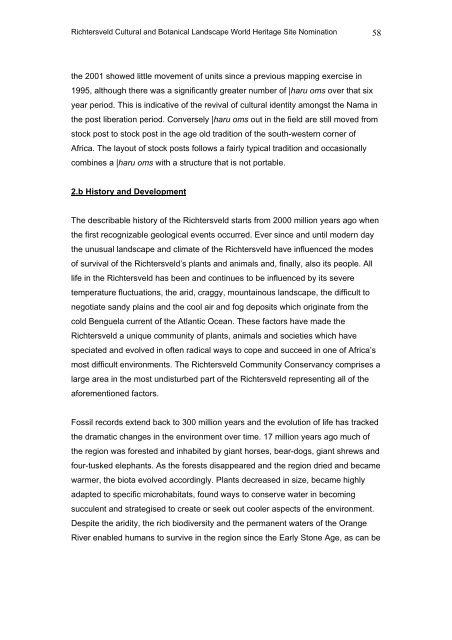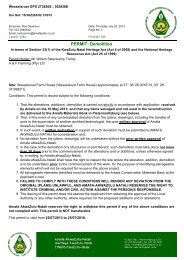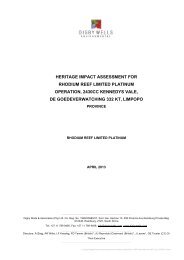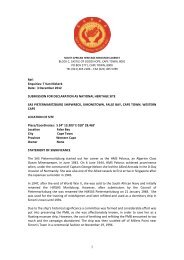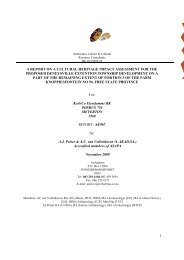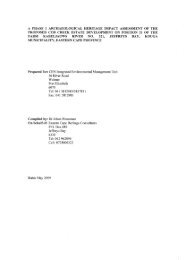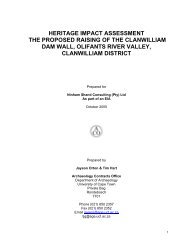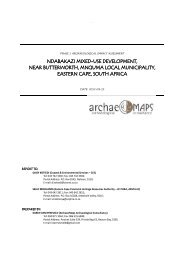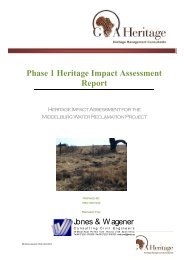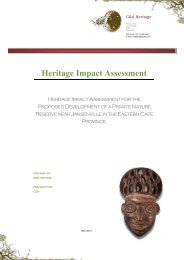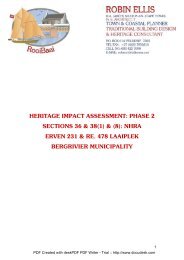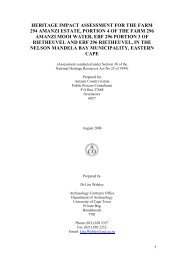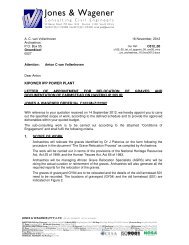the richtersveld cultural and botanical landscape - SAHRA
the richtersveld cultural and botanical landscape - SAHRA
the richtersveld cultural and botanical landscape - SAHRA
Create successful ePaper yourself
Turn your PDF publications into a flip-book with our unique Google optimized e-Paper software.
Richtersveld Cultural <strong>and</strong> Botanical L<strong>and</strong>scape World Heritage Site Nomination 58<br />
<strong>the</strong> 2001 showed little movement of units since a previous mapping exercise in<br />
1995, although <strong>the</strong>re was a significantly greater number of |haru oms over that six<br />
year period. This is indicative of <strong>the</strong> revival of <strong>cultural</strong> identity amongst <strong>the</strong> Nama in<br />
<strong>the</strong> post liberation period. Conversely |haru oms out in <strong>the</strong> field are still moved from<br />
stock post to stock post in <strong>the</strong> age old tradition of <strong>the</strong> south-western corner of<br />
Africa. The layout of stock posts follows a fairly typical tradition <strong>and</strong> occasionally<br />
combines a |haru oms with a structure that is not portable.<br />
2.b History <strong>and</strong> Development<br />
The describable history of <strong>the</strong> Richtersveld starts from 2000 million years ago when<br />
<strong>the</strong> first recognizable geological events occurred. Ever since <strong>and</strong> until modern day<br />
<strong>the</strong> unusual l<strong>and</strong>scape <strong>and</strong> climate of <strong>the</strong> Richtersveld have influenced <strong>the</strong> modes<br />
of survival of <strong>the</strong> Richtersveld’s plants <strong>and</strong> animals <strong>and</strong>, finally, also its people. All<br />
life in <strong>the</strong> Richtersveld has been <strong>and</strong> continues to be influenced by its severe<br />
temperature fluctuations, <strong>the</strong> arid, craggy, mountainous l<strong>and</strong>scape, <strong>the</strong> difficult to<br />
negotiate s<strong>and</strong>y plains <strong>and</strong> <strong>the</strong> cool air <strong>and</strong> fog deposits which originate from <strong>the</strong><br />
cold Benguela current of <strong>the</strong> Atlantic Ocean. These factors have made <strong>the</strong><br />
Richtersveld a unique community of plants, animals <strong>and</strong> societies which have<br />
speciated <strong>and</strong> evolved in often radical ways to cope <strong>and</strong> succeed in one of Africa’s<br />
most difficult environments. The Richtersveld Community Conservancy comprises a<br />
large area in <strong>the</strong> most undisturbed part of <strong>the</strong> Richtersveld representing all of <strong>the</strong><br />
aforementioned factors.<br />
Fossil records extend back to 300 million years <strong>and</strong> <strong>the</strong> evolution of life has tracked<br />
<strong>the</strong> dramatic changes in <strong>the</strong> environment over time. 17 million years ago much of<br />
<strong>the</strong> region was forested <strong>and</strong> inhabited by giant horses, bear-dogs, giant shrews <strong>and</strong><br />
four-tusked elephants. As <strong>the</strong> forests disappeared <strong>and</strong> <strong>the</strong> region dried <strong>and</strong> became<br />
warmer, <strong>the</strong> biota evolved accordingly. Plants decreased in size, became highly<br />
adapted to specific microhabitats, found ways to conserve water in becoming<br />
succulent <strong>and</strong> strategised to create or seek out cooler aspects of <strong>the</strong> environment.<br />
Despite <strong>the</strong> aridity, <strong>the</strong> rich biodiversity <strong>and</strong> <strong>the</strong> permanent waters of <strong>the</strong> Orange<br />
River enabled humans to survive in <strong>the</strong> region since <strong>the</strong> Early Stone Age, as can be


